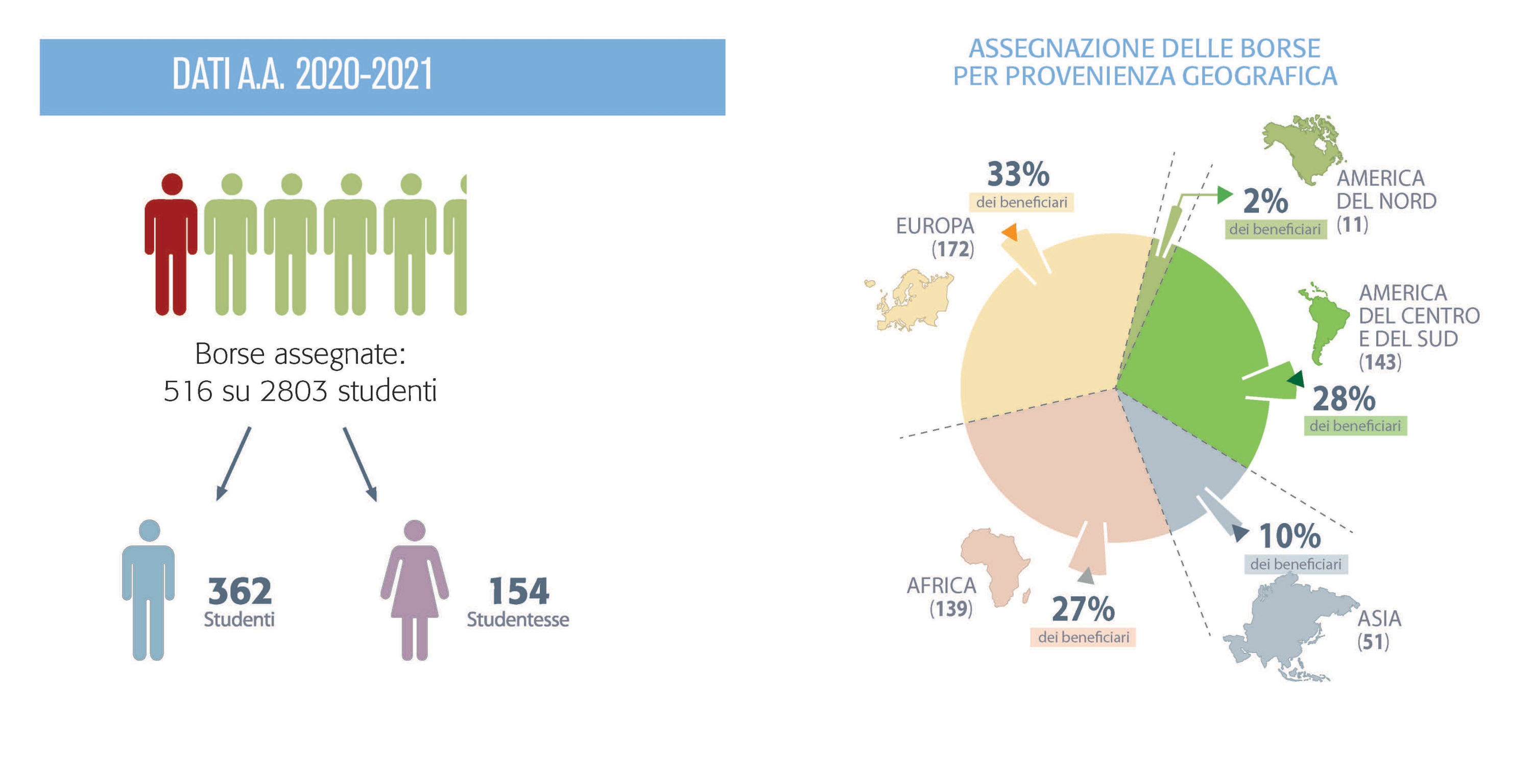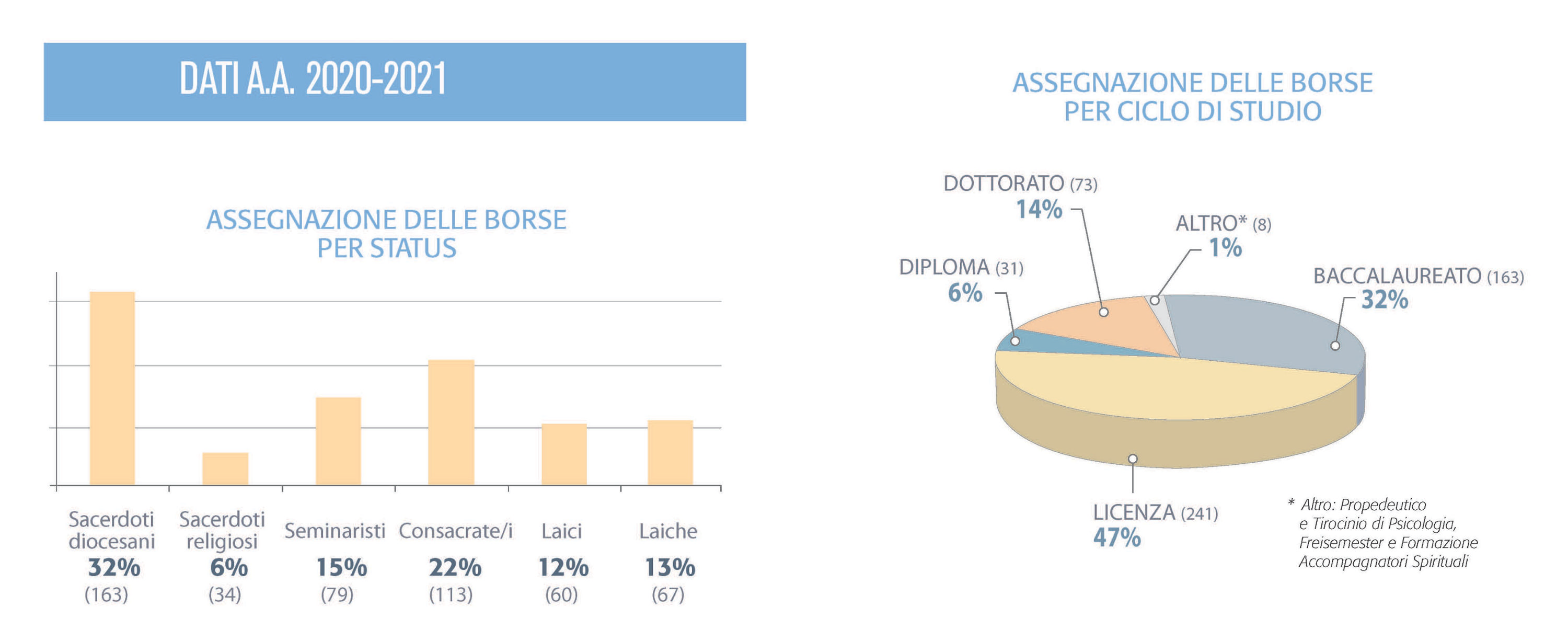- Home
- La Gregoriana
- 60 - Synod 2021-2024 | Walking Together
- Ensuring access to education for all
Share:

The Scholarships Office is well-organised today, with clear guidelines, strongly inclusive and sensitive to everyone’s needs. Ensuring access to education for persons experiencing conditions of need has become increasingly important. There is growing support for the laity and for women’s academic formation.
The Gregoriana has given out approximately eight thousand scholarships since it started formalising its support for students almost 25 years ago. The numbers, like the donations earmarked therefor, have steadily increased over the years. Suffice it to mention that in the 2020-2021 academic year - the last one for which definitive figures are available - almost one in six students received financial aid: 516 scholarships were awarded (362 students and 154 female students) out of a total of 2,803 students, corresponding to a total amount of over 734,000 euro. The Faculties most involved in this process are Theology (184 scholarship holders), Social Sciences (143) and Philosophy (45). These are significant numbers, testifying to a firm commitment to include as many applicants as possible in the academic programs.
“Education support activity is naturally connected with every educational institution that wishes to ensure universal access to education. In the ecclesial world, this is felt even more strongly, and the Gregorian University was determined to fulfil this important and fundamental role,” said Fr. Joseph Xavier S.J., Rector’s Delegate for the Scholarship Office. “Hence, in 1998, with the help of benefactors, a Scholarship Fund was created to award scholarships designed to cover tuition fees for financially disadvantaged students who were preparing to be evangelisers in their home countries and who were found meritorious by virtue of their academic achievements. This activity grew over the years, also thanks to the ever-growing contributions of the University’s benefactors. After a fairly long period of transition, the Scholarship Office is fully operational, with clear guidelines, with a markedly inclusive focus, and sensitive to everyone’s needs.”
And today?
“We are proud to say that the number of students supported in various ways has increased significantly compared to the beginning and that, above all, the nature of the support offered has changed. While the majority of scholarships are still awarded for the payment of academic fees, there are cases where learning support is more substantial and covers also the costs of living - often a major obstacle when deciding to study in Rome.
Similarly, the Fondo Sostegno Studi al Consorzio (FSSCV), another major scholarship fund created in 2017 by the Father General at the Jesuit General Curia to promote the formation of pastoral leaders in the neediest Churches, adopts the same approach. For several years now, care for those in need has clearly assumed a central role in the allocation of available resources. To a large extent, this criterion goes hand in hand with merit-based evaluation.”

Is the Scholarship Office of a pontifical university a “step ahead” in comparison to its equivalent in a State university?
“We try to do our best to reduce red tape. Furthermore, as an ecclesiastical institution, we adopt a pastoral approach to students’ needs. It is our commitment to help everyone, but we do not take the criterion of academic performance as binding. We help the person in need, as we are taught in the Gospel parable of the Good Samaritan. We are always open to genuine requests for help, whether for academic fees or living expenses, insofar as available resources allow.”
In the academic year 2020-2021, a very high number of students received a scholarship, almost one-sixth. Is there an estimate of the number of scholarships awarded by the Office since its creation?
“We estimate a total of over 8,000 scholarships awarded between 1998 and the previous academic year - with the latest available figures. We are pleased to have contributed to the education of so many students and, through them, to have actively contributed to the growth of the local churches.”

Have any clear trends been observed in recent years?
“The nature of the grantees has emerged more clearly over the years, both in terms of origin and status. Scholarships are granted to everyone, including those who come from the so-called ‘first world’, however, there has been a growing awareness of students from extremely poor and disadvantaged realities. Moreover, a marked openness has developed with regard to new generations of students from countries that have hitherto been less present in pontifical universities.
Also with regard to status, there is growing support for the laity, with a special focus on women’s education.”
Which criteria must be met in applying for a scholarship?
“Requirements and procedures are detailed on our website. The one indication I would like to convey to those seeking support is that we examine every request we receive with a pastoral spirit."
Also with regard to status, support for lay students, with a focus on women’s education, has been steadily increasing.”
The student’ stories describe the situation of the local churches. Which aspects stand out?
“Many stories of difficulties have emerged over the years - including in the last three years of my term as Delegate of the Rector - which cannot be ignored. The daily interaction with all of our students prompts us to step up our efforts, both by trying to find customised solutions for their needs, and by offering full collaboration with institutions responsible for securing funding, notably the Gregorian University Foundation (Washington D.C. - Toronto - Rome) and the Freundeskreis der Gregoriana, operating in Germany. Without their hard work and the numerous and generous benefactors of the University, to whom we extend our heartfelt thanks, all that has been accomplished over the years would not have been possible.
Do you keep in touch with your scholarship recipients? Are you informed of their activities even after their return to their countries of origin or to their missions?
“Yes and no. However, even if we lose track of our students’ lives, we know that having contributed to their integral formation has left a significant mark that will shine through their future choices, and that is what matters most. Naturally, many of these alumni continue to keep in touch with us, usually for holiday greetings. Some write to thank us. We welcome and gladly return the expressions of affection of our alumni.”
How can a scholarship student at the Gregorian can be sustained?
“If a generous person is willing to help a student, that is indeed something of great value. They may contact us directly by phone or email (+39 06 6701 5271 - [email protected]). Our office assists individual benefactors in finding the most suitable candidates for awarding their donations. We ensure that the beneficiaries express their appreciation, especially during the Christmas period, and, when possible, we also arrange informal meetings.”

